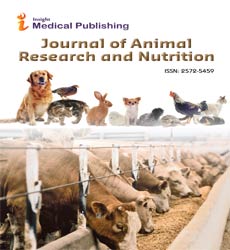Untargeted Analysis of Veterinary Drugs in Food
Xian Chen*
Xian Chen*
Department of animal science, Vocational College, Taizhou, China
- *Corresponding Author:
- Xian Chen
Department of animal science, Vocational College, Taizhou, China
E-mail:xian_c@yahoo.com
Received date: February 08, 2022, Manuscript No. IPJAM-22-12988; Editor assigned date: February 10, 2022, PreQC No. IPJAM-22-12988 (PQ); Reviewed date: February 25, 2022, QC No. IPJAM-22-12988; Revised date: March 05, 2022, Manuscript No. IPJAM-22-12988 (R); Published date: March 08, 2022, DOI: 10.36648/2572-5459.7.3.12
Citation: Chen X (2022) Untargeted Analysis of Veterinary Drugs in Food. J Anim Res Nutr Vol. 7 No.3: 012.
Description
Veterinary drug store can shift from a clinical setting to a local area drug store setting. As human prescriptions become all the more prominently endorsed for creatures and greater local area drug stores start to stock creature medicine, perhaps the most well-known settings for veterinary drug store is in an autonomous, or intensifying drug store. An intensifying drug store is a normal foundation for "veterinary drug specialists," as these drug stores have practical experience in intensifying medicine to more readily fit the requirements of a patient, as is frequently fundamental for creature patients. Extra practice locales incorporate mail-request drug stores or veterinary instructing medical clinics. While these positions are less normally accessible, drug specialists can be gainful assets in veterinary schools, because of their insight into pharmacology. Of the 28 veterinary schools in the US, 27 utilize drug specialists. In the United States Veterinary drug store is a field of drug store practice, in which veterinary drug specialists may intensify meds, fill remedies, and oversee drug treatments for creatures. Veterinary drug specialists are authorized drug specialists who have practical experience in the circulation of prescriptions for creatures.
Veterinary Drug Residues in Food
This varies somewhat from the title of "veterinary drug store trained professional," who may furthermore work in counseling, examination, and schooling for veterinary drug store. Ordinary drug specialists in an assortment of settings become an integral factor in the readiness and apportioning of creature meds also. As veterinarians treat a wide assortment of creatures with a wide assortment of items, drug specialists can help deal with these medicines through their compounding and medication information. Compounding is frequently vital for creature patients, as they require various measurements and medicine structures from people. Through compounding, drug specialists can change a medicine for a creature so it is more engaging in taste or appearance. The act of veterinary drug store is an arising field in the United States. Among the main references to the drug specialist's part in veterinary medication surfacing around 50 years prior were articles tending to the utilization of anti-toxins and veterinary biological. A few distributions have featured the expanding inclusion of drug store in creature medical care in the United States.
Veterinary Medication
Drug specialists really focusing on creatures were at first utilized by veterinary schools; the part of these drug specialists involved medicine choice and stock and model control. In the United States, The principal notice of veterinary drug store may trace all the way back to around 1960, when writing was distributed orchestrating veterinary medication and anti-infection use. In the United Kingdom drug specialists were associated with apportioning veterinary solutions and in any event, treating and euthanizing little creatures up to the mid-1950s however the action generally stopped with the raising necessities of human wellbeing under the developing National Health Service and the death of the Veterinary Surgeons Act of 1966. There were a couple pharmacies that provided ranchers however it was not until the last part of the 1970s when the term Veterinary Pharmacist came into money. With the advent of the RPSGB Diploma (see underneath) the term accumulated fame. The interaction started with the arrangement of a 7-part warning gathering made out of enormous, little, and outlandish creature veterinarians; veterinary emergency clinic, local area based, and clinical setting drug specialists; and a drug store instructor. The gathering's underlying gathering was given to a conversation of the assessments and perceptions considered in the writing the veterinary drug specialist's job and of the individuals' considerations about the spaces of data to be in the principal poll. This conversation brought about the arrangement of 10 open-finished inquiries organized to catch data about the apparent job, preparing necessities, drug store school's job, obstructions to rehearse, related advantages, and practice settings related with the customary drug specialist who upholds the requirements of the veterinarian and with the drug specialist who rehearses exclusively in veterinary drug store. The portrayal of a customary drug specialist who upholds the necessities of the veterinarian (henceforth alluded to as the veterinary drug specialist) and a drug specialist who rehearses exclusively in veterinary drug store (in the future alluded to as the veterinary drug store trained professional) was not given on the poll and was surrendered to translation by the master specialist. The warning gathering at that point distinguished 20 specialists in their individual regions to serve on every one of 7 boards, and therefore welcomed 143 specialists to partake as specialists in the examination.
All canines four months or more seasoned are needed to be inoculated for rabies. It is additionally suggested that felines be inoculated for rabies. It is neither financially practical nor advocated from a general wellbeing stance to immunize all animals against rabies. Antibodies may contain either living or executed living beings or sanitized antigens from these organic entities. Antibodies containing living creatures will in general trigger the best defensive reactions. Slaughtered living beings or sanitized antigens might be less immunogenic than living ones since they can't develop and spread in the host. In this manner, they are more averse to animate the insusceptible framework in an ideal design. Then again, they are frequently more affordable and might be more secure. Living infections from antibodies, for instance, contaminate have cells and develop momentarily. The tainted cells at that point interaction the viral antigens, setting off a reaction overwhelmed by cytotoxic T-cells, a sort1 reaction. Executed living beings and purged antigens, interestingly, generally invigorate reactions overwhelmed by antibodies, a sort 2 reaction. This kind of reaction may not create ideal security against certain life forms.

Open Access Journals
- Aquaculture & Veterinary Science
- Chemistry & Chemical Sciences
- Clinical Sciences
- Engineering
- General Science
- Genetics & Molecular Biology
- Health Care & Nursing
- Immunology & Microbiology
- Materials Science
- Mathematics & Physics
- Medical Sciences
- Neurology & Psychiatry
- Oncology & Cancer Science
- Pharmaceutical Sciences
